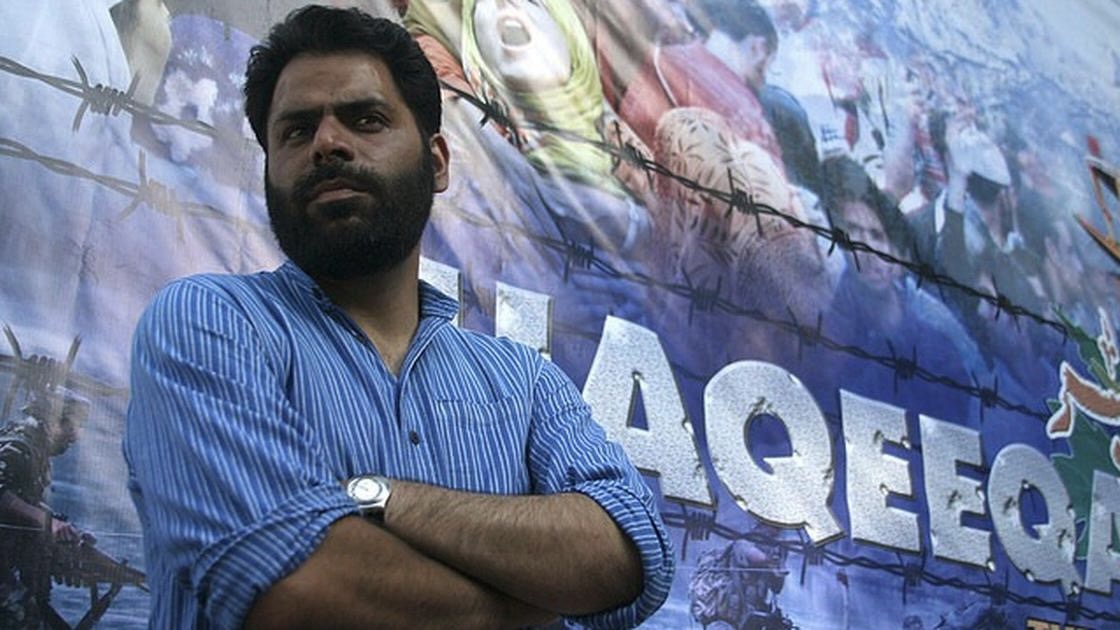Individuals and organizations across the world have raised their voices to demand the release of 44-year-old Kashmiri human rights defender Khurram Parvez as part of an international campaign. Following his arrest by an anti-terror agency during an nocturnal raid on November 22 in Srinagar, dozens of international human rights organizations have called for the immediate and unconditional release of the coordinator of Jammu and Kashmir Coalition of Civil Society (JKCCS).
Organizations such as Amnesty International, University Network for Human Rights, Samidoun Palestinian Prisoners Network, #StandWithKashmir as well as Mary Lawlor the UN Special Rapporteur on Human Rights Defenders, have condemned the activist’s arrest saying the anti-terror laws are being misused to criminalized the work of human rights defenders in India.
On November 22, Indian authorities arrested the noted Kashmiri activist Parvez on terror related charges. Many argue that his arrest is a consequence of his work to raise awareness to the violations committed by the security forces in the Jammu and Kashmir region. According to the campaign, his arrest represents an “escalation of India’s campaign to suppress the democratic and human rights of disfavored groups and ensure impunity for state violations”.
A program coordinator at Jammu Kashmir Coalition of Civil Society (JKCCS), Parvez has been advocating for human rights not only in Jammu and Kashmir, but in Pakistan, East Timor, the Philippines and Sri Lanka and several other states of India.
On December 20, he was again re-elected as the chairman of Asian Federation Against Involuntary Disappearances for the third time. At the time of the announcement the federation said, they miss his presence and wise words at this time and hope to have him on board again.
A panel of UN human rights experts including Mary Lawlor, Luciano Hazan, and several others released a statement on December 22 to condemn Parvez’s arrest and continued detention: “We are concerned that one month after Parvez’s arrest, he is still deprived of liberty in what appears to be a new incident of retaliation for his legitimate activities as a human rights defender and because he has spoken out about violations… In view of this context of previous reprisals, we call on the Indian authorities to immediately release him and ensure his rights to liberty and security.”
Defending human rights
Jammu and Kashmir Coalition of Civil Society’s documentation and advocacy work primarily focuses on “torture, extrajudicial killings, involuntary disappearances and landmine removal”. According to Rupert Colville, a spokesperson at the Geneva-based UN High Commissioner for Human Rights’ office, Parvez is known as a tireless advocate for families of the disappeared and has been targeted before for his human rights work.
“In 2016, he was detained under another controversial law, the Public Safety Act, for two and a half months after being prevented from traveling to the Human Rights Council in Geneva. He was released after the Jammu and Kashmir High Court declared his detention illegal,” UN High Commission’s spokesperson Colville, said.
Following the downgrading of the state into two union territories in August 2019 and subsequent repressive means imposed in the Kashmir region such as the mass arrest of youngsters and assault and intimidation of activists, a sense of fear-psychosis has been installed in the region. Many victims are now avoiding reporting any sort of violations out of fear of reprisals.
This in addition to the repeated raids and subsequent seizure of records from human rights organizations including JKCCS and Association of Parents of Disappeared Persons (APDP), have added to the overall decrease in hope for accountability in Kashmir.
“Khurram Parvez, why is he in jail today?…His organization has documented the horror of what the Indian state has done in Kashmir, that is why he is in jail. Because he is exposing the terrorism and the terrorists the Indian state is,” the acclaimed author Arundhati Roy, stated in a press conference on December 16, a few weeks after his arrest.
As the JKCCS and APDP have stressed in their reports, the Kashmir region continues to have no representative governance in place. The region has no international access, no free speech, no freedom of assembly and no access to justice.
With the censorship imposed and frequent use of the Unlawful Activities Prevention Act to intimidate and arrest journalists and human rights defenders alike, this work has almost been rendered ineffective. Many people are apprehensive that with the arrests of prominent activists the authorities are trying to send a message that they won’t allow any sort of critical voices.
Jostein Hole Kobbeltvedt, director of the Rafto Foundation which works for the global promotion of human rights, has also condemned activist’s arrest, saying he “regret that the Indian government intimidates citizens working to secure the values and norms enshrined both in the Constitution of India and in international treaties ratified by the government itself. We appeal to Indian authorities to respect Mr. Parvez’s habeas corpus rights and release him from detention without delay.”
The campaign that has garnered international solidarity highlighted that “Parvez’s arrest furthers the Indian state’s broad assault on civil society. As India’s national security adviser recently acknowledged, the Indian state is at war with civil society. Through statutes like the Unlawful Activities Prevention Act, the Indian state has expanded its arsenal of lawless laws in Jammu and Kashmir and ramped up its war against dissenting voices, civil society and marginalized groups.”





